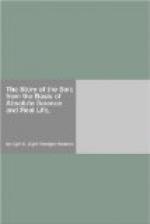“I am a Yankee,” said Percy. “Why have American statesmen ridden back and forth to the national capitol through a wilderness of depleted and abandoned farms in the eastern states for half a century or more before the first appropriation was made for the purpose of agricultural investigation? and why, even now, does not this rich federal government appropriate to the agricultural experiment station in every state a fund at least equal to the aggregate salaries of the congressmen from the same state, this fund to be used exclusively for the purpose of discovering and demonstrating profitable systems of permanent agriculture on every type of soil? Why do we as a nation expend five hundred million dollars annually for the development of the army and navy, and only fifteen millions for agriculture, the one industry whose ultimate prosperity must measure the destiny of the nation?
“Moralists sometimes tell us that the fall of the Babylonian Empire, the fall of the Egyptian Empire, of the Grecian Empire, and the Roman Empire, were all due to the development of pride and immorality among those peoples; whereas, we believe that civilization tends rather toward peace, security, and higher citizenship. Is not the chief explanation for the ultimate and successive fall of those great empires to be found in the exhausted or wasted agricultural resources of the country?
“The land that once flowed with milk and honey might then support a mighty empire, with independent resources sufficient for times of great emergencies, but now that land seems almost barren and supports a few wandering bands of marauding Arabs and villages of beggars.
“The power and world influence of a nation must pass away with the passing of material resources; for poverty is helpless, and ignorance is the inevitable result of continued poverty. Only the prosperous can afford education or trained intelligence.
“Old land is poorer than new land. There are exceptions, but this is the rule. The fact is known and recognized by all America.
“What does it mean? It means that the practice of the past and present art of agriculture leads toward land ruin,—not only in China, where famine and starvation are common, notwithstanding that thousands and thousands of Chinese are employed constantly in saving every particle of fertilizing material, even gathering the human excrements from every house and by-place in village and country, as carefully as our farmers gather honey from their hives; not only in India where starvation’s ghost is always present, where, as a rule, there are more hungry people than the total population of the United States; not only in Russia where famine is frequent; but, likewise in the United States of America, the present practice of the art of agriculture tends toward land ruin.
“Nations rise and fall; so does the productive power of vast areas of land. Better drainage, better seed, better implements, and more thorough tillage, all tend toward larger crops, but they also tend toward ultimate land ruin, for the removal of larger crops only hastens soil depletion.




